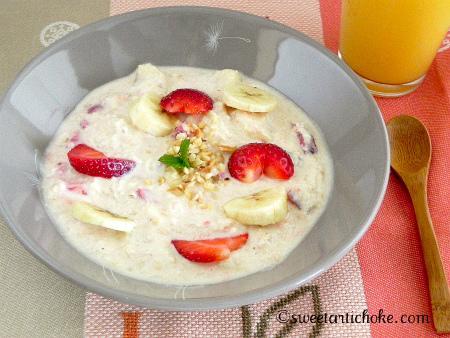 (en français, plus bas, après la partie sur Zürich)
(en français, plus bas, après la partie sur Zürich)
As you might have read in my earlier post, this month, I am happily hosting AWED on Swiss Cuisine and it is my hope that you will discover a little bit more about my beautiful country throughout the month.

So let’s start our Swiss Journey, by a very Swiss breakfast: the Bircher-Müesli. If nowadays “muesli” is a general term for a mixture of cereals, nuts and dry fruits eaten in many places of the world, the origin of the Müesli goes back to the early 1900ies, when the Swiss doctor Max Bircher-Benner developed his recipe for a healthy breakfast preparation that was called after him, the “Bircher Müesli”.
After conducting numerous nutritional experiments with raw food, Dr Bircher-Benner was indeed convinced of the importance of healthy nutrition to keep a good health. This might sound like an obvious thing to us, but in the early 1900ies, this idea was pretty revolutionary. Because of it, Dr Bircher was even dismissed from the Medical Association/Order of his time.
The doctor believed in the healing properties of raw fruits and vegetables, because, in his holistic vision of the world, they were directly benefiting from the energy of the sun, and thus were the healthiest food that could be eaten. He also advocated for meals with little or no meat, dark bread, plenty of fruit and vegetables and dairy products. A real pioneer, indeed!
There are probably as many recipes for the Bircher Müesli as there are flakes of oat in bowl of muesli, but here is the one I usually prepare at home.
Ingredients for 2 servings:
5 tablespoons thick cut organic oats
1.5 dl orange juice
200g yogurt (cow or soy milk)
1 apple
juice of a lemon
1 banana
1 cup berries (I took strawberries)
1 teaspoon coarsely chopped nuts (I used dry roasted hazelnuts)
1 teaspoon dry fruits (I used raisins)
optional:
2 tablespoons honey or 1 tablespoon agave nectar
1 dl cream (skimmed or full cream)
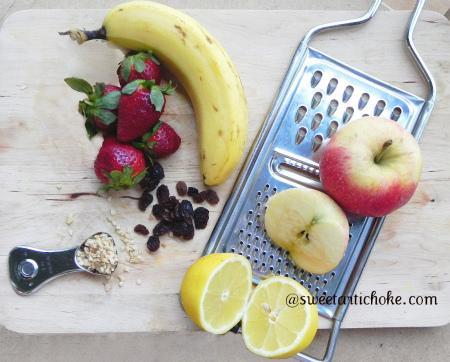
Method:
Put the oats in a big bowl. Pour the orange juice over it. Keep aside for 1 hour.
Stir in the yogurt and combine well. Cover and refrigerate overnight or for at least 6 hours.
After that time, peel and grate the apple and slice the banana. Pour the lemon juice over them and combine well.
Slice the other fruits or cut them in bite-size pieces.
Add the grated apple, sliced banana, sliced berries, dry fruits and nuts to the yogurt-oat mixture. Combine well.
You may want to whisk in 1 dl of cream and sweeten your Bircher with some honey or agave nectar. Personally, I do not like to have cream or sugar in it, the dry fruits being a natural sweetener, it is enough for my palate.
Sprinkle some coarsely chopped nuts on top of it and serve.
It can be kept one day in the refrigerator, covered with a lid.
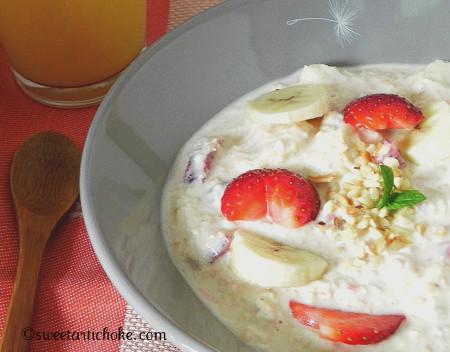
Now that you have eaten your Swiss breakfast, I am taking you for a little tour of Zurich…
Zurich is the biggest city in Switzerland, located in the heart of the country. It is also a canton. I know, it is sometimes confusing that both the main town and the canton have the same name! The language spoken there is German and the Swiss German dialect, but most people will know some English, especially in the shops. The city is located at one end of the lake of… Zurich and it also stretches on both side of the Limmat River.
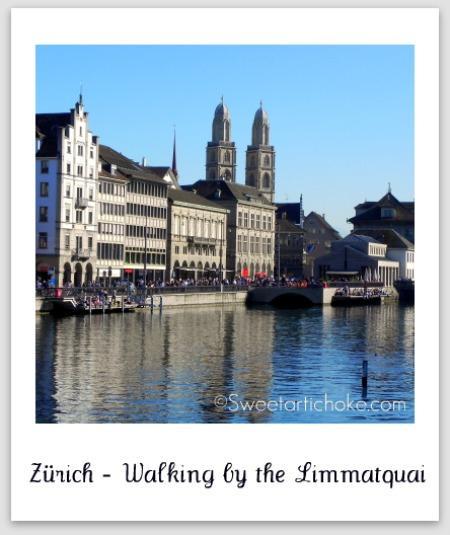
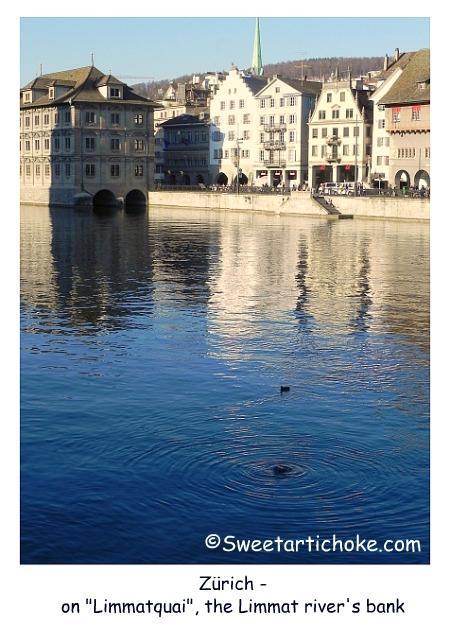
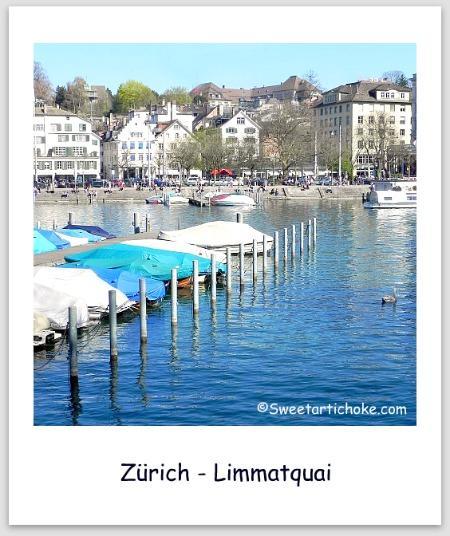
Zurich is the economical hub of the country. It is among the world’s largest financial centers and the home to a large number of financial institutions and banks… Switzerland’s two biggest banks the UBS and Credit Suisse have their headquarters on the most famous street of the city, called the Bahnhofstrasse(the Train Station Street). This street is famous for its banks, its exclusives boutiques (not my favourite at all, but it is worth seeing!!) and for the chocolate lovers, because you can find the Sprüngli confectionery shop there. That name might not sound familiar to you, but if I talk aboutLindt & Sprüngli chocolates, better known as “Lindt“, you might guess that the place has its historical importance chocolate-wise…
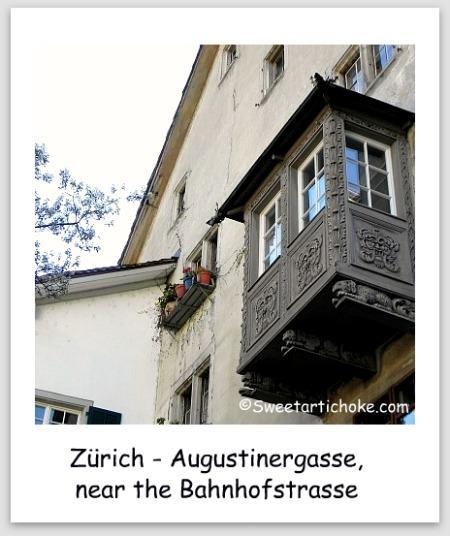
Whenever I go to Zürich, I enjoy walking in the old town (“Altstadt” in German), which spreads on both sides of the Limmat River. On one side, there is the lovely Linden Square (“Lindenhof”) a great view point of the river…

… and on the other side, the Niederdorf area, which is a very bubbly area, full of restaurants, bars, cool shops, artists… but – don’t be offended – some of its streets are kind of Red Light District, too…

Here are some of Sweet Artichoke’s favourite places in Zurich:
- Restaurant Hiltl: the oldest vegetarian restaurant in Europe, serving vegetarian food since 1898. It is my favourite food spot whenever I go to Zurich. Located in a street perpendicular to the famous Bahnhofstrasse, Hiltl restaurant has two sections: the classical restaurant, with menu, etc.. and the ever popular huge buffet, where you select whatever food item you like and weight it. Lots of vegan options are available, too and the soy milk capuccino is simply fantastic!
(website: here and R. Hiltl’s recipe for Bircher Muesli is here)
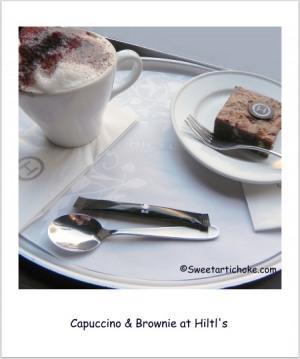
- Rietberg Museum: located in a beautiful park, close to the lake, this is my favourite museum in Zurich. It is one of the only art museum for non-European cultures in Switzerland displaying artefacts from Asia, Africa and Ancient America. As mentioned on its website, the Rietberg museum” intends not only to focus on the fascinating variety of artistic expression, but also to raise interest and understanding of foreign cultures, views and religions“. Totally my kind of place! In addition, it has quatterly exhibitions on a specific theme. Currently it is: The Way of the Masters, The Great Artists of India, 1100–1900. (Museum Rietberg website, click here)

- Schwarzenbach: As you might know, a new place automatically means “new food” for me and whenever I go to Zürich, I always bring back something from Schwarzenbach. Don’t let the name of the shop put you off…. Schwarzenbach Kolonialwaren Kaffeerösterei litterally means “products from the colonies and coffee roaster Schwarzenbach”, because this shop is a real gem ! Since 1864, it sells all sorts of fine foods, starting with a very large selection of teas, coffees and spices, but also unusual items, such as green rice from Vietnam, black salt from Hawai, and so on… (more info, in German, here)
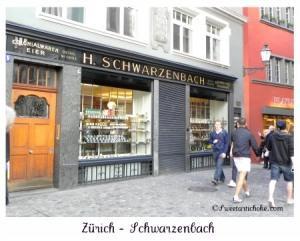
le Bircher Muesli
Comme vous avez pu lire dans mon précédent post, ce mois-ci, j’accueille l’événement blog appelé AWED, qui a pour thème la cuisine suisse et j’espère que ça sera l’occasion de découvrir un peu ce beau pays…
Commençons donc notre voyage en Suisse, par un petit déjeuner très typique: le Bircher-Muesli. De nos jours “muesli” est un terme général pour un mélange de céréales, de noix et fruits secs
qui est mangé dans de nombreux pays du monde, cependant, l’origine du muesli remonte au début des années 1900, lorsque le docteur suisse Max Bircher-Benner a développé sa recette pour la préparation d’un petit-déjeuner sain et roboratif qui a été nommé d’après son nom, le “Bircher Muesli”.
Après avoir mené de nombreuses expériences sur l’alimentation à base d’aliments crus, le Dr Bircher Benner était en effet convaincu de l’importance d’une nutrition saine pour garder une bonne santé.
Cette vision peut paraître évidente pour nous, mais dans les années1900, cette idée était plutôt
révolutionnaire. C’est d’ailleurs à cause d’elle que le Dr Bircher a même été révoqué de l’Ordre des Médecins de son temps. Il croyait en particulier aux propriétés curatives des fruits et légumes, parce que, dans sa vision holistique du monde, ce sont eux qui bénéficient directement de l’énergie du soleil, et donc ils font partie des aliments les plus sain que l’on peut manger. Il a également préconisé que les repas devaient comporter peu ou pas de viande, du pain noir, beaucoup de fruits et légumes et produits laitiers.
Il ya probablement autant de recettes pour le Bircher muesli qu’il ya de flocons d’avoine
dans un bol de muesli, mais voici celle que je prépare à la maison.
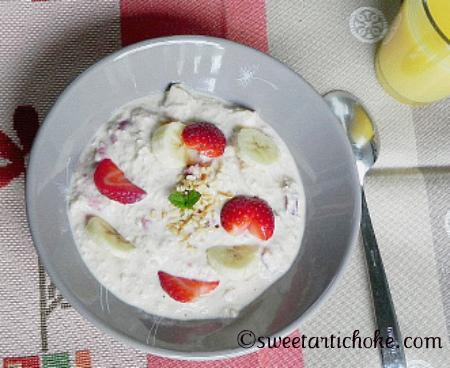
Ingrédients pour 2 portions:
5 cuillères à soupe de flocons d’avoine bio
1,5 dl de jus d’orange
200g de yogourt (lait de vache ou de soja)
1 pomme
jus d’un citron
1 banane
1 tasse de baies ou autres fruits (pour moi, des fraises )
1 cuillère à café d’oléagineux , concassés (j’ai utilisé des noisettes grillées à sec)
1 cuillère à café de fruits secs (pour moi : des raisins secs)
en option:
2 cuillères à soupe de miel ou 1 cuillère à soupe de sirop d’agave
1 dl de crème (crème entière ou demi-crème)
Préparation:
Mettre les flocons d’avoine dans un grand bol. Verser le jus d’orange dessus. Laisser reposer pendant 1 heure.
Incorporer le yogourt et bien mélanger. Couvrir et réfrigérer jusqu’au lendemain ou pendant au moins
6 heures.
Après ce temps, éplucher et râper la pomme et couper la banane. Verser le jus de citron dessus et mélanger.
Ajouter les pommes râpées, les rondelles de bananes, les fruits coupés, les fruits secs et les noix mélange yaourt/flocons d’avoine. Bien mélanger le tout.
Vous pouvez ajouter 1 dl de crème et sucrer votre Bircher avec un peu de miel ou de sirop d’agave. Personnellement je n’aime pas du tout l’ajout de la crème, ni du sucre.
Saupoudrer de quelques noisettes et servir.
S’il en reste, le bircher se conserve encore un jour au réfrigérateur , couvert.
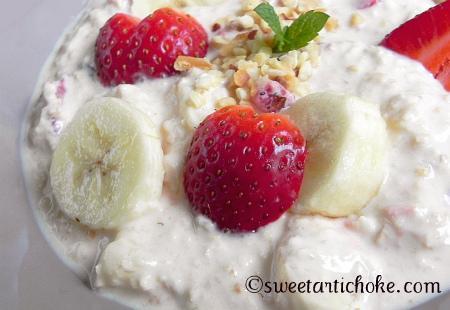
Maintenant que vous avez mangé votre petit-déjeuner suisse, je vous emmène faire un petit tour à
Zürich …
Les 3 endroits préférés de Sweet Artichoke à Zurich:
- Restaurant Hiltl: le plus ancien restaurant végétarien d’Europe, qui sert des repas végétariens depuis
1898. C’est pour moi une pause gourmande obligatoire chaque fois que je vais à Zurich. En plus, comme il est situé dans une rue perpendiculaire à la célèbre Bahnhofstrasse, il est très facile à trouver. Le restaurant Hiltl comporte deux sections: le restaurant classique, avec un menu, etc. et un immense buffet très populaire, où vous choississez ce que vous voulez, puis pesez votre assiette et payez Il y a en plus beaucoup d’options « vegan » et leur capuccino au lait de soja est tout simplement fantastique!
(Site web: ici et la recette de R. Hiltl pour Bircher Muesli est ici)
- Le Musée Rietberg: situé dans un magnifique parc, à proximité du lac, c’est mon
musée préféré à Zurich. Il est l’un des seuls musées d’art pour les cultures non-européennes en Suisse et expose des objets en provenance d’Asie, d’Afrique et l’Amérique ancienne. Comme indiqué sur son site Internet, le musée Rietberg « entend non seulement se concentrer sur les fascinantes variétés de l’expression artistique, mais aussi à susciter l’intérêt et la compréhension des cultures étrangères, des opinions et des religions “. Tout à fait mon genre d’endroit !! En outre, il a chaque trimestre une exposition portant sur un thème spécifique. Actuellement, c’est sur les grands artistes de l’Inde, de 1100 à1900. (Musée Rietberg site, cliquez ici)
- Schwarzenbach: Comme vous le savez peut-être, chaque fois que je visiteou voyage un autre endroit que chez moi, cela signifie que je suis à la recherche de nouvelles expériences gustatives… Alors quand je vais à Zürich, je ramène presque toujours quelque chose de chez Schwarzenbach. Ne laissez pas le nom du magasin vous rebuter : en effet, même si Schwarzenbach Kolonialwaren Kaffeerösterei signifie littéralement «produits des colonies et torréfacteur de café Schwarzenbach », ce magasin est un véritable bijou! Depuis 1864, il vend toutes sortes de produits d’épicerie fine, à commencer par une très grande sélection de thés, cafés et épices, mais également des aliments inhabituels, comme le riz vert du Vietnam, le sel noir de Hawaï, etc… (Plus d’infos, en allemand, ici)
Filed under: almonds, apple, banana, blueberry, breakfast, cereals, cranberry, date, dry apricots, dry figs, dry fruits, eggless, Event, figs, fruits, goji berries, hazelnuts, lemon, nuts, oat, orange, raisins, raspberry, rice milk or cream, seeds, spices, strawberry, sunflower seeds, Switzerland, Tea, walnut
